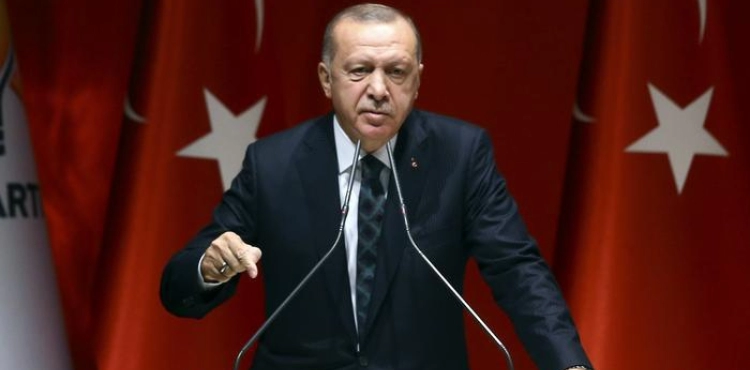Turkish President Recep Tayyip Erdogan announced on Saturday that Damascus will "pay the price" for attacks targeting his forces that claimed the lives of more than 30 elements in northwestern Syria after about a month of continuous escalation between the two sides.
On the other hand, and within the framework of his pressure campaign to get European countries to support him, Erdogan said that he will keep the borders of his country open to immigrants, at a time when the Turkish-Greek border witnessed confrontations between elements of the police and immigrants trying to cross into Greece.
In Moscow, the Ministry of Foreign Affairs announced meetings with Turkish officials during which emphasis was placed on the need to reduce the escalation in Idlib governorate, where, with the support of Russian forces, since December a large-scale offensive has been launched against areas controlled by the Headquarters for the Liberation of Al-Sham (formerly Nusra) and other opposition factions. Turkish forces. The Syrian forces have made significant progress on the ground in the past weeks.
"I told (Russian President Vladimir) Putin: + What are you doing there? If you want to create a base, come on, do it, but get out of our way. Leave us alone with the (Syrian) regime," Erdogan said during a speech in Istanbul today.
He added that the Syrian forces "will pay the price" for their attacks against Turkish forces. "We do not want things to reach this point, but they force us to do so. They will pay the price," he said.
On Thursday, Turkey suffered its worst losses in one attack since its military intervention in Syria began in 2016, as at least 33 soldiers were killed in air strikes, which Ankara accused the Syrian regime forces of carrying out in Idlib.
Ankara responded with strikes against regime forces that resulted in the killing of 48 Syrian soldiers and 14 members of the Lebanese Hezbollah guerrillas fighting alongside the regime, during the past 24 hours, according to the toll of the Syrian Observatory for Human Rights.
A Turkish official, who declined to be identified, declared that his country destroyed a "chemical weapons facility located 13 kilometers south of Aleppo (north), as well as a large number of the regime´s targets."
Syrian television denied the existence of this facility. There has been no official response from Damascus, which has consistently confirmed that it has destroyed its nuclear arsenal.
The heavy losses incurred by Ankara come after weeks of escalation in Idlib between Turkish and regime forces, which have clashed repeatedly.
Since the beginning of February, after the first attack that killed a number of its forces, Ankara has sent huge military reinforcements to Idlib to be added to the 12 observation points that it is setting up in the region under an agreement with Moscow dating back to 2018. At least three of these points are now surrounded by forces the system.
The number of Turkish soldiers killed in Idlib in February rose to about 50. Tension threatens to widen the gap between Ankara and Moscow, which is the main supporter of the Syrian regime. Despite their differences on the Syrian file, Russia and Turkey have been coordinating regarding the conflict in Syria, and they have cooperated for years in the fields of defense and energy.
The Russian Foreign Ministry announced on Saturday that during meetings between Russian and Turkish officials on Wednesday and Thursday, "the focus was on reducing escalation on the ground while continuing to combat terrorists."
In New York, the UN Security Council held its sixth meeting on Syria since the beginning of February, at the invitation of Western countries, including the United States, Britain and France.
A majority of Security Council members called for an urgent ceasefire in Idlib.
And considered that "these attacks show that the Syrian regime, with the help and political support of Russia, continues its military strategy at any cost, ignoring the consequences of its actions against civilians."
The United Nations has repeatedly called for "the avoidance of the greatest human horror story of the twenty-first century".
The attack in and around Idlib, according to the United Nations, pushed 948,000 people, about half of them children, to flee to safer areas to the north, especially near the Turkish border where camps for the displaced are spread.
Turkey, which hosts about 3.6 million Syrian refugees, fears that the regime´s ongoing offensive will push a new wave of asylum to it, and therefore keep its borders closed to IDPs who are crowded in camps or living in the open and in schools, mosques and buildings under construction near the border.
Erdogan said on Saturday that his country could not "deal" with a new wave of displaced Syrians.
"What we did yesterday ... is to open our doors," he added. "We will not close our doors ... Why? Because the European Union must fulfill its pledges." Turkey and the European Union signed an agreement in 2015 aimed at stemming the flow of migrants across the border after the migration crisis in Europe. Through it, the European Union committed itself to providing assistance to Ankara.
Erdogan said that 18,000 migrants crossed the Turkish border towards Europe since Friday.
It is not possible to confirm the accuracy of this figure. But at the Turkish-Greek border, thousands of refugees spent the night devouring them yesterday. On Saturday, Greek police used tear gas to prevent the refugees, some of whom threw stones at the security forces, from crossing, according to reporters at the scene.
Greece announced on Saturday that four thousand immigrants from Turkey were prevented from entering its territories "illegally".
"Yesterday, Greece faced an organized and illegal attempt to breach our borders in large numbers and was able to overcome them," said government spokesman Stelios Pestas.












